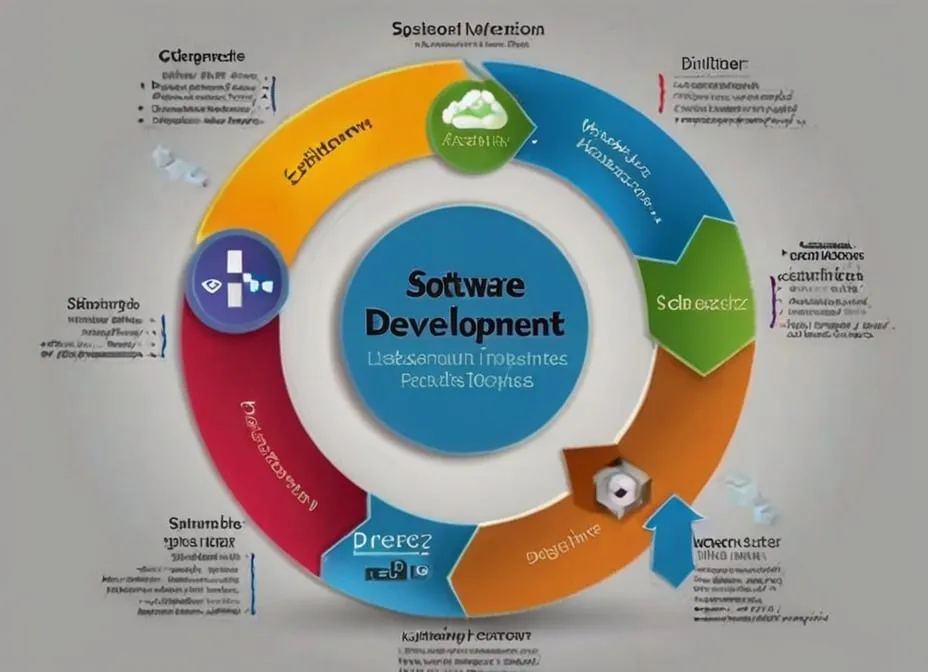Machine Learning: How Algorithms are Shaping Decisions

Welcome to the fascinating world of machine learning, where algorithms are quietly transforming the way we live, work, and make decisions! Imagine a computer program that learns and improves on its own, without the need for explicit programming. That's the magic of machine learning, a powerful technology that's rapidly reshaping our world.
In this comprehensive guide, we'll embark on a journey to demystify machine learning. We'll delve into its core concepts, explore its diverse applications, and examine its profound impact on our daily lives. But fear not, this won't be a dry technical lecture. We'll break down complex ideas into bite-sized pieces, using relatable examples and keeping the tone engaging and informative. So, buckle up and get ready to unlock the secrets of machine learning!
Demystifying Machine Learning: A Peek Under the Hood
What is Machine Learning?
Unlike traditional programming, where you meticulously instruct a computer on every step, machine learning takes a different approach. Here, algorithms learn from data, gradually improving their performance on a specific task. Think of it like training a child. You provide them with examples and guidance, and over time, they develop the ability to perform similar tasks independently.
Core Concepts: Algorithms, Data, and Models
At the heart of machine learning lie three fundamental elements:
- Algorithms: These are the recipes that guide the learning process. Imagine them as a set of instructions that the machine learning model follows to analyze data, identify patterns, and make predictions.
- Data: This is the fuel that powers machine learning. The more data an algorithm is exposed to, the better it learns and performs. Data can come in various forms, from text and images to numbers and audio recordings.
- Models: These are the digital representations of what the algorithm learns from the data. Think of them as condensed knowledge bases that the machine learning system uses to make decisions or predictions.
Unveiling the Learning Process
There are three main categories of machine learning, each with its unique learning approach:
- Supervised Learning: Imagine having a patient teacher by your side. In supervised learning, the data is labeled, meaning it's pre-classified with the desired outcome. The algorithm analyzes this labeled data, learning the relationship between the inputs (data) and the outputs (labels). For example, in spam filtering, emails are labeled as spam or not spam. The machine learning model analyzes these labeled emails, learning the patterns that distinguish spam from legitimate emails.
- Unsupervised Learning: This is where the student takes charge! Unlike supervised learning, the data in unsupervised learning is unlabeled. The algorithm's task is to uncover hidden patterns and structures within the data itself. For example, imagine a machine learning model analyzing customer purchase history data. It might identify clusters of customers with similar buying habits, allowing businesses to personalize marketing campaigns.
- Reinforcement Learning: This approach is inspired by how we learn through trial and error. The algorithm interacts with an environment, receiving rewards for desired actions and penalties for undesirable ones. Over time, the algorithm learns to optimize its behavior to maximize rewards. This is a complex area, but it's used in applications like training AI robots to navigate their surroundings.
By understanding these core concepts and learning styles, we can begin to appreciate the immense potential of machine learning to tackle a wide range of challenges. In the next section, we'll delve into some of the exciting ways machine learning is transforming our world!
From Science Fiction to Everyday Reality: Applications of Machine Learning
Machine learning, once a concept relegated to the realm of science fiction, is now woven into the fabric of our daily lives. From the recommendations that pop up on your favorite streaming service to the filters that enhance your social media photos, machine learning algorithms are working behind the scenes to personalize and optimize your experience. Let's explore some of the most impactful applications of machine learning across different industries.
Recommender Systems: Powering Up Your Online Experience
Ever scrolled through Netflix and felt like the platform eerily knows exactly what you want to watch next? That's the magic of recommender systems, powered by machine learning. These systems analyze your past viewing history, preferences, and even ratings from other users with similar tastes. Based on this data, the algorithm recommends content it believes you'll enjoy.
Tailored Product Suggestions and Content Recommendations
Recommender systems aren't limited to entertainment. They're also used by e-commerce platforms to suggest products you might be interested in based on your browsing history and past purchases. Similarly, social media platforms leverage machine learning to curate your news feed, prioritizing content that aligns with your interests and keeps you engaged.
How Machine Learning Fuels the Recommendation Engine
So, how does machine learning make these eerily accurate recommendations? Here's a simplified breakdown:
- Data Collection: The system gathers information about your online behavior, such as what you watch, buy, or click on.
- Feature Engineering: This involves transforming the raw data into a format suitable for analysis by the machine learning algorithm.
- Model Building and Training: Different algorithms, like collaborative filtering or content-based filtering, are trained on the prepared data. These algorithms learn to identify patterns and relationships between items.
- Recommendations Generation: Once trained, the model uses its knowledge to predict which items you're most likely to interact with and generates personalized recommendations.
Recommender systems are a win-win for both users and businesses. Users discover new content and products they might enjoy, while businesses benefit from increased engagement and sales.
Machine Learning in Finance: Making Smarter Decisions with Data
The world of finance is no stranger to the power of machine learning. Algorithmic trading, for instance, leverages machine learning models to analyze vast amounts of market data at lightning speed. These models can identify patterns and trends that might escape even the most seasoned human analyst, allowing for more informed trading decisions.
Algorithmic Trading and Risk Management
Machine learning isn't just about making money; it also plays a crucial role in managing risk. Financial institutions use machine learning models to assess creditworthiness, identify potential fraud, and even predict market fluctuations. This allows them to make better lending decisions, mitigate financial risks, and protect their customers.
From Fraud Detection to Personalized Financial Advice
Machine learning is also transforming the way we manage our finances. Robo-advisors, for example, are automated investment platforms that utilize machine learning algorithms to create personalized investment portfolios based on your individual financial goals and risk tolerance. Additionally, machine learning can be used to detect fraudulent activity on your credit card or bank account, providing an extra layer of security for your hard-earned money.
The applications of machine learning in finance are vast and ever-evolving. As financial data continues to grow exponentially, machine learning will undoubtedly play a critical role in shaping the future of this industry.
Healthcare Revolutionized: Machine Learning's Impact on Medicine
The healthcare industry is undergoing a significant transformation fueled by the power of machine learning. From aiding in disease diagnosis to accelerating drug discovery, machine learning algorithms are transforming the way we approach medicine, offering the potential for earlier interventions, improved treatment outcomes, and even personalized healthcare solutions.
Medical Diagnosis and Disease Prediction
Machine learning algorithms can analyze vast amounts of medical data, including patient records, imaging scans, and lab results. By identifying patterns and correlations within this data, these algorithms can assist doctors in diagnosing diseases more accurately and efficiently. For instance, machine learning models can analyze mammograms to detect signs of breast cancer with a high degree of accuracy, potentially leading to earlier diagnoses and better patient outcomes.
Personalized Medicine and Drug Discovery
Machine learning is paving the way for a future of personalized medicine. By analyzing a patient's unique genetic makeup, medical history, and lifestyle factors, machine learning models can help healthcare professionals tailor treatment plans to each individual's specific needs. This personalized approach has the potential to improve treatment efficacy and reduce side effects.
Furthermore, machine learning is accelerating the drug discovery process. By analyzing vast datasets of molecular structures and biological information, machine learning algorithms can identify potential drug candidates with greater efficiency. This can significantly reduce the time and cost associated with bringing new drugs to market, ultimately benefiting patients in dire need of new treatment options.
Here's a glimpse into some of the specific applications of machine learning in healthcare:
- Image Analysis: Machine learning can analyze medical images, such as X-rays, MRIs, and CT scans, to detect abnormalities and aid in diagnosing diseases.
- Predictive Analytics: Algorithms can analyze patient data to predict the risk of developing certain diseases, allowing for preventive measures to be taken.
- Drug Development: Machine learning can help researchers identify promising drug targets and design more effective treatments.
- Chatbots and Virtual Assistants: These AI-powered tools can answer patients' questions, schedule appointments, and even provide basic medical advice.
The integration of machine learning in healthcare is still in its early stages, but the potential for positive impact is undeniable. As machine learning algorithms continue to evolve and healthcare data becomes more readily available, we can expect even more groundbreaking advancements in this field. However, it's crucial to remember that machine learning is a tool, and like any tool, it needs to be used responsibly. In the next section, we'll delve into the influence of machine learning on our choices and the ethical considerations that come with it.
The Algorithmic Influence: How Machine Learning Shapes Our Choices
Machine learning algorithms are silently shaping our decisions in profound ways, often operating behind the scenes and influencing everything from our career paths to our political views. While this algorithmic influence can offer benefits like personalization and efficiency, it also raises concerns about bias, transparency, and the potential for manipulation. Let's explore some of the key areas where machine learning is impacting our choices.

Machine Learning in the Workplace: From Recruitment to Performance Reviews
The world of work is no stranger to the influence of machine learning. Algorithmic tools are being used in the recruitment process to screen resumes, identify potential candidates, and even conduct initial interviews. While this can streamline the hiring process, it also raises concerns about bias within the algorithms, potentially overlooking qualified candidates who don't "fit the mold."
Automating Hiring Processes and Predicting Employee Potential
Machine learning can also be used to analyze employee performance data and predict future potential. This information can be used to identify training opportunities, optimize team structures, and even make decisions about promotions. However, relying solely on algorithms for these crucial decisions can lead to overlooking valuable human qualities like creativity, leadership skills, and interpersonal skills.
The Rise of Algorithmic Management: Friend or Foe?
Another growing trend is the use of machine learning for algorithmic management. These systems can track employee activity, monitor productivity, and even provide real-time feedback. While proponents argue that this can improve efficiency and performance, critics warn of a dystopian future where employees feel constantly monitored and controlled, potentially leading to decreased morale and burnout.
Shaping Consumer Behavior: Targeted Advertising and Personalized Experiences
Machine learning plays a significant role in shaping our consumer behavior. Targeted advertising is a prime example. By analyzing your online activity, search history, and past purchases, machine learning algorithms can build a profile of your interests and preferences. This allows advertisers to deliver highly targeted ads that are more likely to resonate with you, potentially influencing your purchasing decisions.
The Power of Predictive Analytics: Understanding Your Needs Before You Do
Machine learning goes beyond just targeted advertising. Predictive analytics, a powerful application of machine learning, allows companies to anticipate your needs and personalize your experience. For example, a streaming service might recommend movies you haven't even searched for based on your viewing habits. While this level of personalization can be convenient, it also raises concerns about privacy and the potential for manipulation.
The Ethics of Algorithmic Targeting: A Balancing Act
The ethical implications of algorithmic targeting are complex. While targeted advertising can be beneficial for both consumers and businesses, it can also lead to the creation of "filter bubbles," where users are only exposed to information and products that confirm their existing beliefs. This can limit their exposure to diverse viewpoints and potentially hinder critical thinking.
The Algorithmic Filter Bubble: Are We Living in Our Echo Chambers?
Machine learning algorithms are adept at personalizing search results and social media news feeds. By analyzing your past interactions and preferences, these algorithms prioritize content that is likely to keep you engaged. While this can be a positive experience, it also creates a risk of living in an "echo chamber," where you're only exposed to information that reinforces your existing views.
How Machine Learning Personalizes Search Results and News Feeds
Here's a simplified explanation of how machine learning personalizes your online experience:
- Data Collection: Platforms collect data on your online behavior, such as search queries, clicked links, and liked content.
- Profile Building: This data is used to create a profile of your interests and preferences.
- Content Filtering: Algorithms use your profile to prioritize content that aligns with your interests, potentially limiting your exposure to diverse viewpoints.
Combating echo chambers requires a conscious effort from both users and platforms. Users can actively seek out diverse viewpoints, while platforms can implement algorithms that promote a wider range of content.
By acknowledging the potential pitfalls of algorithmic influence, we can work towards a future where machine learning is used ethically and responsibly to shape our choices, not dictate them. In the next section, we'll explore the future of machine learning, examining its potential to revolutionize various aspects of our lives while addressing the challenges that come with it.
The Future of Machine Learning: Opportunities and Challenges
Machine learning is rapidly evolving, and its impact on our world is only just beginning to unfold. As we look towards the future, there are exciting opportunities to leverage machine learning for good, but also significant challenges that need to be addressed. Let's delve into some of the key areas shaping the future of machine learning.
Machine Learning and Automation: The Rise of Intelligent Machines
One of the most significant future implications of machine learning lies in automation. As algorithms become more sophisticated, they will increasingly automate tasks currently performed by humans. This has the potential to revolutionize various industries, from manufacturing and logistics to customer service and healthcare.
Will Algorithms Take Over Our Jobs? Exploring the Future of Work
While automation raises concerns about job displacement, it's important to remember that it also creates new opportunities. The future of work will likely involve human-machine collaboration, where machines handle repetitive tasks and humans focus on creative problem-solving, critical thinking, and social interaction. The key lies in equipping ourselves with the skills and adaptability needed to thrive in this evolving landscape.
The Importance of Human-Machine Collaboration: A Symbiotic Future
The future of work doesn't have to be a dystopian vision of humans replaced by robots. A more realistic scenario involves humans and machines working together in a symbiotic relationship. Machines can handle the data analysis and repetitive tasks, while humans provide the creativity, strategic thinking, and emotional intelligence needed to tackle complex challenges.
Here are some potential benefits of human-machine collaboration:
- Increased productivity and efficiency
- Enhanced decision-making through data-driven insights
- Reduced human error in areas like data analysis and complex calculations
The Ethical Landscape of Machine Learning: Ensuring Fairness and Transparency
As machine learning becomes more pervasive, ethical considerations become paramount. One of the biggest challenges lies in ensuring fairness and transparency in algorithms. Machine learning models are only as good as the data they're trained on, and biased data can lead to biased algorithms that perpetuate discrimination.
Addressing Algorithmic Bias: Mitigating Discrimination in Machine Learning
There are several ways to address algorithmic bias:
- Using diverse datasets for training machine learning models
- Implementing fairness metrics to identify and mitigate bias
- Employing human oversight in the development and deployment of machine learning algorithms
The Need for Explainable AI: Understanding How Algorithms Make Decisions
Another crucial aspect of ethical machine learning is explainability. Often, machine learning models are complex "black boxes" where the decision-making process is opaque. This lack of transparency can be problematic, especially when algorithms are used for high-stakes decisions like loan approvals or criminal justice. The development of Explainable AI (XAI) is crucial to ensure that machine learning algorithms are fair, unbiased, and accountable.
By actively addressing these ethical challenges, we can ensure that machine learning is used for good, promoting a future where it benefits all of humanity.
Conclusion: Machine Learning - A Tool for Progress, Used Wisely
Machine learning is a powerful tool with the potential to revolutionize various aspects of our lives. From personalized healthcare to intelligent automation, the applications of machine learning are vast and ever-evolving. However, it's crucial to remember that machine learning is just a tool, and like any tool, it can be used for good or bad.
The future of machine learning hinges on our ability to harness its potential for progress while mitigating its potential pitfalls. By fostering ethical development, ensuring transparency, and prioritizing human-machine collaboration, we can ensure that machine learning shapes a brighter future for all.
Here are some additional resources you might find helpful:
- A Gentle Introduction to Machine Learning: URL how does machine learning work for dummies ON dummies.com
- The Future of Jobs Report: URL the future of jobs report 2020 ON World Economic Forum weforum.org
- Ethics in Artificial Intelligence: URL ethics in artificial intelligence ON Stanford University ai100.stanford.edu
Frequently Asked Questions (FAQs) about Machine Learning
1. Is machine learning the same as artificial intelligence (AI)?
Machine learning is a subfield of artificial intelligence (AI). AI is a broad term encompassing any technique that enables machines to mimic human intelligence. Machine learning, on the other hand, focuses on algorithms that can learn and improve from data without explicit programming.
2. Are there any risks associated with machine learning?
Yes, there are potential risks associated with machine learning, such as:
- Bias: Machine learning algorithms can perpetuate bias if trained on biased data. This can lead to discriminatory outcomes in areas like loan approvals or criminal justice.
- Privacy: Machine learning algorithms often require vast amounts of data to function effectively. This raises concerns about data privacy and the potential for misuse of personal information.
- Job displacement: As machine learning automates tasks currently performed by humans, there's a risk of job displacement in certain sectors.
3. What are some of the ethical considerations surrounding machine learning?
Here are some key ethical considerations in machine learning:
- Fairness: Ensuring that algorithms are unbiased and don't discriminate against certain groups.
- Transparency: Understanding how algorithms make decisions and being able to explain their reasoning.
- Accountability: Determining who is responsible for the outcomes of machine learning algorithms.
- Privacy: Protecting individual privacy when collecting and using data for machine learning.
4. What can I do to learn more about machine learning?
There are many resources available online and offline to learn more about machine learning. Here are a few suggestions:
- Online courses: Platforms like Coursera, edX, and Udacity offer introductory and advanced courses on machine learning.
- Books: Several excellent books explain machine learning concepts in a clear and accessible way. A Gentle Introduction to Machine Learning by Jared Peters is a good starting point.
- Podcasts and blogs: There are numerous podcasts and blogs dedicated to machine learning, offering insights from experts in the field.
5. Will machine learning take over my job?
While machine learning will undoubtedly automate many tasks, it's unlikely to completely replace human jobs. The future of work will likely involve collaboration between humans and machines. Equipping yourself with skills in areas like critical thinking, creativity, and problem-solving will be crucial in the evolving job market.










